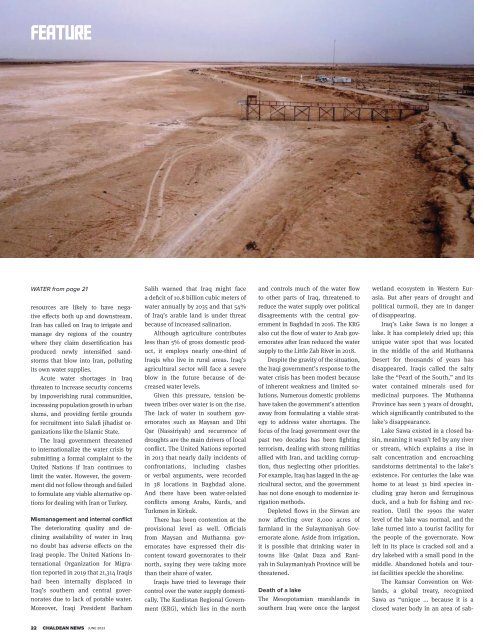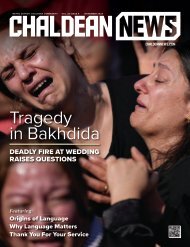Create successful ePaper yourself
Turn your PDF publications into a flip-book with our unique Google optimized e-Paper software.
FEATURE<br />
WATER from page 21<br />
resources are likely to have negative<br />
effects both up and downstream.<br />
Iran has called on Iraq to irrigate and<br />
manage dry regions of the country<br />
where they claim desertification has<br />
produced newly intensified sandstorms<br />
that blow into Iran, polluting<br />
its own water supplies.<br />
Acute water shortages in Iraq<br />
threaten to increase security concerns<br />
by impoverishing rural communities,<br />
increasing population growth in urban<br />
slums, and providing fertile grounds<br />
for recruitment into Salafi jihadist organizations<br />
like the Islamic State.<br />
The Iraqi government threatened<br />
to internationalize the water crisis by<br />
submitting a formal complaint to the<br />
United Nations if Iran continues to<br />
limit the water. However, the government<br />
did not follow through and failed<br />
to formulate any viable alternative options<br />
for dealing with Iran or Turkey.<br />
Mismanagement and internal conflict<br />
The deteriorating quality and declining<br />
availability of water in Iraq<br />
no doubt has adverse effects on the<br />
Iraqi people. The United Nations International<br />
Organization for Migration<br />
reported in 2019 that 21,314 Iraqis<br />
had been internally displaced in<br />
Iraq’s southern and central governorates<br />
due to lack of potable water.<br />
Moreover, Iraqi President Barham<br />
Salih warned that Iraq might face<br />
a deficit of 10.8 billion cubic meters of<br />
water annually by 2035 and that 54%<br />
of Iraq’s arable land is under threat<br />
because of increased salination.<br />
Although agriculture contributes<br />
less than 5% of gross domestic product,<br />
it employs nearly one-third of<br />
Iraqis who live in rural areas. Iraq’s<br />
agricultural sector will face a severe<br />
blow in the future because of decreased<br />
water levels.<br />
Given this pressure, tension between<br />
tribes over water is on the rise.<br />
The lack of water in southern governorates<br />
such as Maysan and Dhi<br />
Qar (Nassiriyah) and recurrence of<br />
droughts are the main drivers of local<br />
conflict. The United Nations reported<br />
in 2013 that nearly daily incidents of<br />
confrontations, including clashes<br />
or verbal arguments, were recorded<br />
in 38 locations in Baghdad alone.<br />
And there have been water-related<br />
conflicts among Arabs, Kurds, and<br />
Turkmen in Kirkuk.<br />
There has been contention at the<br />
provisional level as well. Officials<br />
from Maysan and Muthanna governorates<br />
have expressed their discontent<br />
toward governorates to their<br />
north, saying they were taking more<br />
than their share of water.<br />
Iraqis have tried to leverage their<br />
control over the water supply domestically.<br />
The Kurdistan Regional Government<br />
(KRG), which lies in the north<br />
and controls much of the water flow<br />
to other parts of Iraq, threatened to<br />
reduce the water supply over political<br />
disagreements with the central government<br />
in Baghdad in 2016. The KRG<br />
also cut the flow of water to Arab governorates<br />
after Iran reduced the water<br />
supply to the Little Zab River in 2018.<br />
Despite the gravity of the situation,<br />
the Iraqi government’s response to the<br />
water crisis has been modest because<br />
of inherent weakness and limited solutions.<br />
Numerous domestic problems<br />
have taken the government’s attention<br />
away from formulating a viable strategy<br />
to address water shortages. The<br />
focus of the Iraqi government over the<br />
past two decades has been fighting<br />
terrorism, dealing with strong militias<br />
allied with Iran, and tackling corruption,<br />
thus neglecting other priorities.<br />
For example, Iraq has lagged in the agricultural<br />
sector, and the government<br />
has not done enough to modernize irrigation<br />
methods.<br />
Depleted flows in the Sirwan are<br />
now affecting over 8,000 acres of<br />
farmland in the Sulaymaniyah Governorate<br />
alone. Aside from irrigation,<br />
it is possible that drinking water in<br />
towns like Qalat Daza and Raniyah<br />
in Sulaymaniyah Province will be<br />
threatened.<br />
Death of a lake<br />
The Mesopotamian marshlands in<br />
southern Iraq were once the largest<br />
wetland ecosystem in Western Eurasia.<br />
But after years of drought and<br />
political turmoil, they are in danger<br />
of disappearing.<br />
Iraq’s Lake Sawa is no longer a<br />
lake. It has completely dried up; this<br />
unique water spot that was located<br />
in the middle of the arid Muthanna<br />
Desert for thousands of years has<br />
disappeared. Iraqis called the salty<br />
lake the “Pearl of the South,” and its<br />
water contained minerals used for<br />
medicinal purposes. The Muthanna<br />
Province has seen 3 years of drought,<br />
which significantly contributed to the<br />
lake’s disappearance.<br />
Lake Sawa existed in a closed basin,<br />
meaning it wasn’t fed by any river<br />
or stream, which explains a rise in<br />
salt concentration and encroaching<br />
sandstorms detrimental to the lake’s<br />
existence. For centuries the lake was<br />
home to at least 31 bird species including<br />
gray heron and ferruginous<br />
duck, and a hub for fishing and recreation.<br />
Until the 1990s the water<br />
level of the lake was normal, and the<br />
lake turned into a tourist facility for<br />
the people of the governorate. Now<br />
left in its place is cracked soil and a<br />
dry lakebed with a small pond in the<br />
middle. Abandoned hotels and tourist<br />
facilities speckle the shoreline.<br />
The Ramsar Convention on Wetlands,<br />
a global treaty, recognized<br />
Sawa as “unique ... because it is a<br />
closed water body in an area of sab-<br />
22 CHALDEAN NEWS <strong>JUNE</strong> <strong>2022</strong>

















